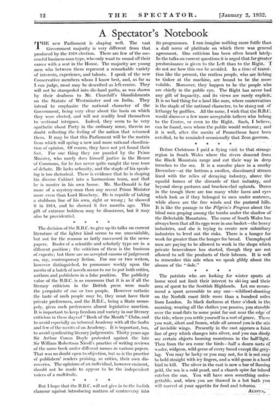The decision of the B.B.C. to give up its talks
on current literature of the lighter kind seems to me unavoidable, but not for the reasons so hotly canvassed in the news- papers. Books of a scientific and scholarly type are in a different position ; the criticism of these is the business of experts ; but there are no accepted canons of judgement on, say, contemporary fiction. For one or two writers, however distinguished, to pronounce weekly upon the merits of a batch of novels seems to me to put both critics, authors and publishers in a false position. The publicity value of the B.B.C. is so enormous that it is as if all the literary criticism in the British press were made the perquisite of one or two people. However catholic the taste of such people may be, they must have their private preferences, and the B.B.C., being a State mono- poly, gives such preferences almost legislative sanction. It is important to keep freedom and variety in our literary criticism in these days of " Book of the Month " Clubs, and to avoid especially an informal Academy with all the faults and few of the merits of an Academy. It is important, too, to avoid syndicating literary judgements. Thirty years ago. Sir Arthur Conan Doyle protested against the late Sir William Robertson Nicoll's practice of writing reviews of the same book under different names in various -papers. That was no doubt open to objection, but so is the practice of publishers' readers praising, as critics, their own dis- coveries. The opinions of an individual, however eminent, should not be made to appear to be the independent voices of a multitude.
* * * *






































 Previous page
Previous page